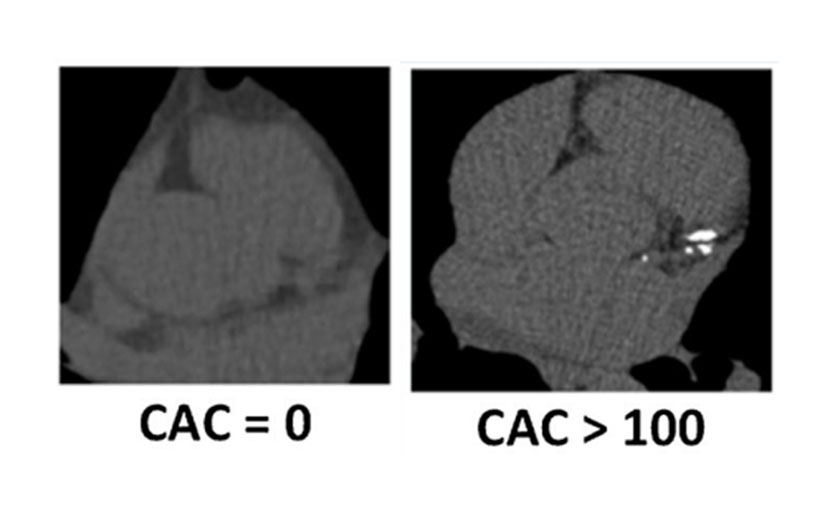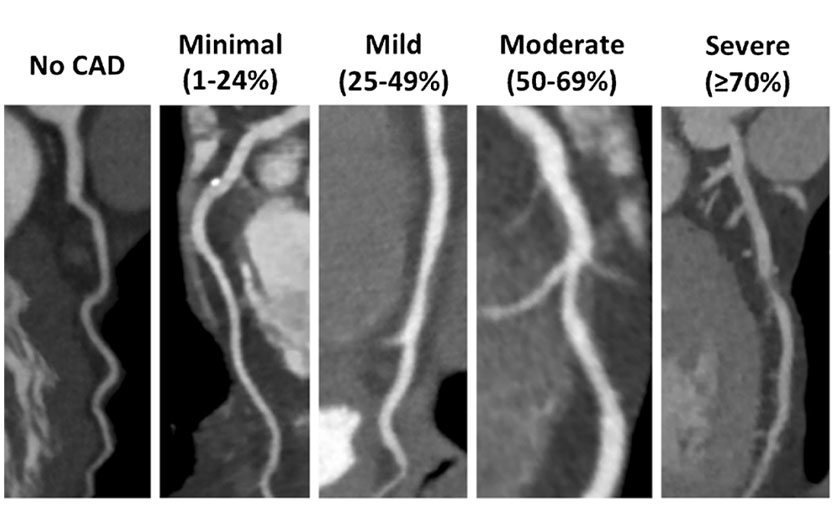
This post was written by Michael Cheezum, MD, PPG – Cardiology.
A HeartSmart CT scan is a preventive scan of your heart that can detect the beginning stages of coronary artery disease. The scan provides patients with a score related to how much hardened plaque was detected in their heart or coronary arteries. There is often a lot of confusion around what this score means and what patients should do with their test results. To help shed light on this and to provide more information about the HeartSmart CT scan in general, let’s run through some of the most frequently asked questions we get in Cardiology regarding HeartSmart CT scan results.
What is a HeartSmart CT scan?
A HeartSmart CT screening is a tool for identifying early stages of coronary artery disease. It’s used to estimate the risk of heart disease, and to guide preventive healthcare in patients who have no symptoms as a screening test. It’s been described as, "a mammogram for the heart arteries."
The screening is performed with a CT scanner, sometimes called a "CAT" scan. A CT scan is a type of x-ray that will image the body and can detect hardened calcified plaque in the heart arteries, just like bones in an x-ray.
What does the HeartSmart CT scan measure?
The test provides a total coronary artery calcium (CAC) score, which is the amount of hardened "calcified" plaque in the wall of the heart arteries. This score is then used to estimate risk of heart disease and guide treatment or preventive care to lower your risk for heart disease. Without treatment, plaque buildup can cause problems with blood flow in the arteries and can lead to a heart attack or stroke.
Does the HeartSmart CT scan measure the amount of "blockage" in my heart arteries?
No. Because the HeartSmart CT scan does not use an IV catheter or intravenous (IV) contrast, the test cannot measure the amount of narrowing or "blockage" of a heart artery. The noncontrast HeartSmart CT scan provides a score, which estimates the amount of hard plaque in the wall of the arteries but does not directly measure artery narrowing. The following examples of CT scans without and with contrast may help to understand what these scans can/cannot see:
HeartSmart CT scan = NO contrast = For patients with NO symptoms as screening test

Coronary CTA = WITH contrast = For patients WITH signs or symptoms of heart disease to measure heart artery "blockage"

Who needs a HeartSmart CT scan?
There is a lot of debate in this area still, even among trained experts (and insurance companies).
To simplify the approach to screening, the Parkview Heart Institute team recommends a HeartSmart CT scan at age 40 in men and age 45 in women. While "soft" noncalcified plaque can develop in the heart arteries in early adulthood (before age 40), hardened calcified plaque often takes longer to form and then to detect on CT scans. For this reason, HeartSmart CT screenings are typically not recommended for men younger than 40 or women younger than 45 years old, unless you have a family history of early heart attack (before age 50).
According to the 2018 Guideline on the Management of Blood Cholesterol, however, HeartSmart CT scans should be used only after you and your clinician have (1) assessed the likelihood of heart attack, stroke or death from these events over the next 10 years using a 10-year risk score; (2) taken into account other risk factors for heart/stroke risk such as family history or certain diseases; and (3) after steps 1 and 2, if doubt remains as to whether you should start a cholesterol therapy.
I already had a HeartSmart or CT scan of my chest, do I need another?
If you had a prior chest CT and the test was normal with no evidence of any plaque in the heart arteries, in general we do not recommend another scan for at least five years, as plaque development is a slow process.
If you had a prior chest CT and the test has already identified plaque in your arteries, then you do not need another HeartSmart CT unless requested by your provider. The prior CT scan already tells us that there is plaque in the arteries and repeating the scan/score typically does not give us any "new" information. This can also be said for patients with known coronary artery disease from other testing (i.e. if you had a prior heart catheterization, stent or bypass surgery then you do not need a HeartSmart CT scan).
A HeartSmart CT scan should not be used to determine if any treatment is working or not. It’s an initial test to guide risk and preventive care.
What does the coronary artery calcium (CAC) score mean?
Your score will fall into one of four categories:
0 (zero): You do not have any hardened plaque in your arteries. You are at low risk for coronary artery disease, heart attack or stroke. Because plaque development is a slow process, it is not recommended to be screened again for five years, unless ordered by your provider. You may be referred to the Cardiovascular Health & Wellness Clinic to learn how you can maintain a healthy heart.
1-99 (mild): Hardened plaque has been shown in your heart arteries. The disease process has begun. Care should be directed towards control of heart disease risk factors (i.e., cholesterol, diabetes, high blood pressure), maintaining a healthy lifestyle (i.e., diet, exercise, weight management, not smoking), and monitoring for any symptoms of heart disease. Follow-up with your provider is recommended to guide treatment. Because you have coronary artery plaque, it is not necessary to be screened again, unless ordered by your provider.
100-399 (moderate): Hardened plaque has been shown in your heart arteries. The disease process has progressed beyond early stages. Care should be directed towards control of heart disease risk factors (i.e., cholesterol, diabetes, high blood pressure), maintaining a healthy lifestyle (i.e., diet, exercise, weight management, not smoking), and monitoring for any symptoms of heart disease. Follow-up with your provider is recommended to guide treatment. Because you have coronary artery plaque, it is not necessary to be screened again, unless ordered by your provider.
400 and above (high): Hardened plaque has been shown in your arteries. The disease process is more advanced. Care should be directed towards control of heart disease risk factors (i.e., cholesterol, diabetes, high blood pressure), maintaining a healthy lifestyle (i.e., diet, exercise, weight management, not smoking), and monitoring for any symptoms of heart disease. Follow-up with your provider is recommended to guide treatment. Because you have coronary artery plaque, it is not necessary to be screened again, unless ordered by your provider.
Can you remove the plaque? How do we treat the plaque that exists?
Unfortunately, no, if you have hardened plaque in your heart arteries, it is there to stay. Moving forward, we will focus your care on treating what we call the “modifiable” risk factors for heart disease. While the two strongest risk factors for heart disease are the ones we can’t control—age and family history—there are a few other factors we can work on. Treatment for these modifiable risk factors can help lower your risk for heart disease and include management of cholesterol, diabetes and high blood pressure. It is also important to maintain a healthy lifestyle (i.e., diet, exercise, weight management, not smoking) and to monitor for any symptoms of heart disease.
In your care for the risk factors for heart disease, the goal is to stabilize the heart artery plaque that exists and to minimize the risk of heart attack or stroke. If you develop symptoms of heart disease, then evaluation with stress testing (and/or heart catheterization) may be needed under the care of your provider.
Why is it called a "calcium" score? Is it OK to take calcium supplements?
The coronary artery calcium score really has nothing to do with the calcium in your bones and in your diet. If you need calcium supplements, take them. Calcium supplements will not impact coronary artery plaque or lead to “calcified” plaque in the heart arteries.
The coronary artery calcium (CAC) score is meant to recognize that the plaque is calcified or hardened, as opposed to noncalcified or soft plaque which is the precursor to hardened plaque.
What are the risks or disadvantages to a HeartSmart CT scan?
There are several potential risks that are important to consider in using HeartSmart CT scans:
• False positive scans may occur: A CT scan may have x-ray image “noise” or calcifications near heart arteries that can lead to a "false positive" scan. In these cases, a patient may have a reported CAC score above zero, when in fact there is no plaque in the arteries. Our HeartSmart CT scan readers are trained to avoid this issue, but rare false positive scans can occur.
• False negative scans may occur: A CT scan slice may miss a region of the heart artery with plaque, either from the scan region missing a part of the heart artery or due to patient movement during the scan. The HeartSmart CT scan is designed to only look for hardened calcified plaque and does not detect soft/noncalcified plaque. Thus, in a patient with a coronary artery calcium (CAC) score of zero, the potential for soft/noncalcified plaque buildup in the heart arteries remains.
• Radiation: The scan is done with x-ray/CT imaging and involves exposing the patient to a low amount of radiation.
• Incidental findings: Potential incidental findings on the HeartSmart CT scan (e.g., pulmonary nodules) can trigger the need and cost for downstream follow-up testing of incidental findings.
If you have questions about the HeartSmart CT scan, talk to your cardiologist or primary care provider. They will be able to help you decide if you should pursue this screening.
More resources
• American College of Cardiology (ACC)
• To compare your HeartSmart CT score to other people your age, visit https://www.mesa-nhlbi.org/Calcium/input.aspx
• For more information from the Multi-Ethnic Study of Atherosclerosis (MESA), one of the largest studies of coronary artery calcium (CAC) scoring to date, visit https://www.mesa-nhlbi.org/




